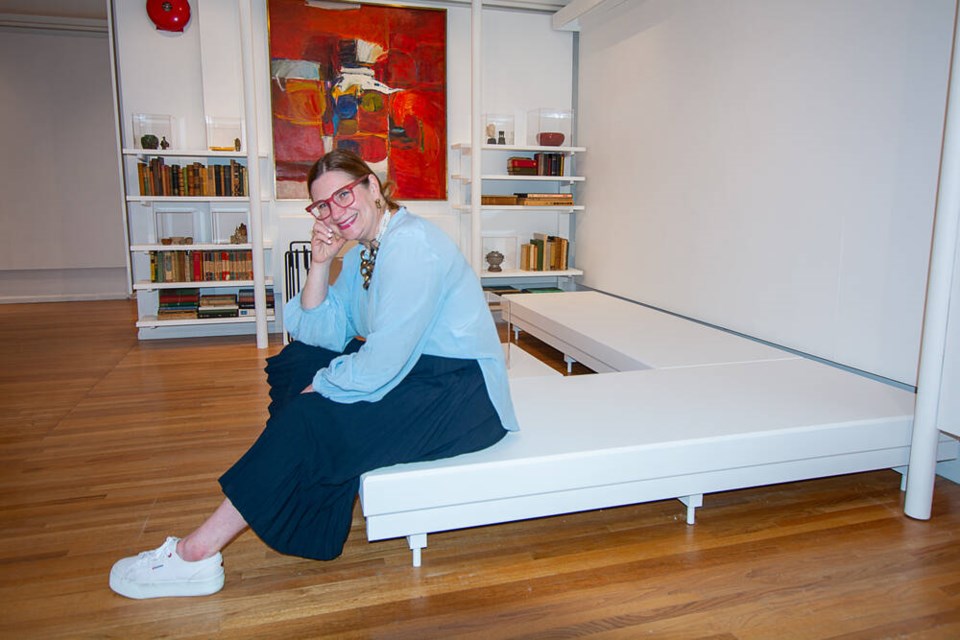One of Canada’s most profound architects never got around to designing his own home.
When Arthur Erickson first bought the property at 4195 West 14th Ave. in Vancouver for $11,000, the lot featured an overgrown garden and a garage with an adjacent storage room.
He intended to eventually build a house there, but in the meantime the budding architect was content to have a “destructive Irish sailor-handyman” knock down some walls and make the oversized garage a comfortable space to live in.
Over the years, Erickson would make additions to the property’s interior and exterior. Those included marble slabs from the urinals of the old Vancouver Hotel, and a contour of the landscape to obscure his neighbour’s “ugly” brown shingle front porch.
Now, those contours of the , alongside many of the objects that otherwise still occupy his home, are on display at the West Vancouver Art Museum.
Running May 15 to July 20, A Refuge: Arthur Erickson also includes Selwyn Pullan’s photography of Erickson in his house, from the museum’s collection.
The exhibit is a collaboration with the Arthur Erickson Foundation, which originated when friends of the beloved architect banded together to save and preserve the property after Erickson declared bankruptcy in 1992.
When he first moved into the house in 1957, Erickson was teaching architecture at UBC and collecting pottery.
“The things that surrounded me were more important to me,” he said years later. “Architecturally, this house is terrible, but it serves as a refuge, a kind of decompression chamber.”
When we think of Erickson, we think of monumental public projects like Robson Square and the Museum of Anthropology, said Hilary Letwin, exhibition co-curator. Or, we think of incredible residential projects like Eppich House I or Eppich House II.
“And here we have him in his home setting where he lived for many decades,” she said. “It’s 680 square feet, so it’s a totally different scale from a lot of his projects.”
Exhibit gives observer a sense of Erickson's modest outlook on life, curator says
Between the white walls of the West Van gallery are souvenirs reflecting Erickson’s fondness for travel and experiencing other cultures. A large head of Buddha sits in a glass case next to a copy of the Bhagavad Gita.
Several paces away, a scale model shows how his property was actually divided on two separate lots, and how the land was contoured to Erickson’s liking.
For Letwin, the most important piece in the gallery is a painting by Gordon Smith, which hung in Erickson’s living room for decades.
“It’s a really remarkable connection to Gordon and Marion Smith in West Vancouver. It was a gift from Gordon to Arthur,” she said. “Gordon and Marion have the distinct recognition of being the only people to have commissioned Arthur to design two homes for them.”
Erickson and the Smiths had a lifelong friendship that included the occasional squabble.
“We know that he and Gordon disagreed about the fireplace at Smith House II, for example, which originally had been designed to be a smooth finish,” Letwin said.
“Gordon didn’t like it, so Arthur would go over there for dinner regularly, and they would get their bush hammers out and whack away at it. That’s why the fireplace in Smith House II has this incredible pebbled appearance,” she added.
Taken together, Erickson’s objects and the photos of him in the home, give the observer a sense of his modest outlook on life, Letwin continues.
“Arthur is remembered as being somebody who loved the public spotlight – we know that he created these massive public projects … he was a public personality. And here, we get this element of surprise,” she said.
“He was a deeply intellectual individual who was always very carefully considering his own environment … he was always curating the space, but it wasn’t a precious interior.”
In one of Pullan’s photos of the home, Erickson is leaning over a desk, which is actually a door propped up by cylinders of rough concrete.
“Is that the table that you expect Arthur to have in his house? No, it’s a little bit of a surprise,” Letwin said.




